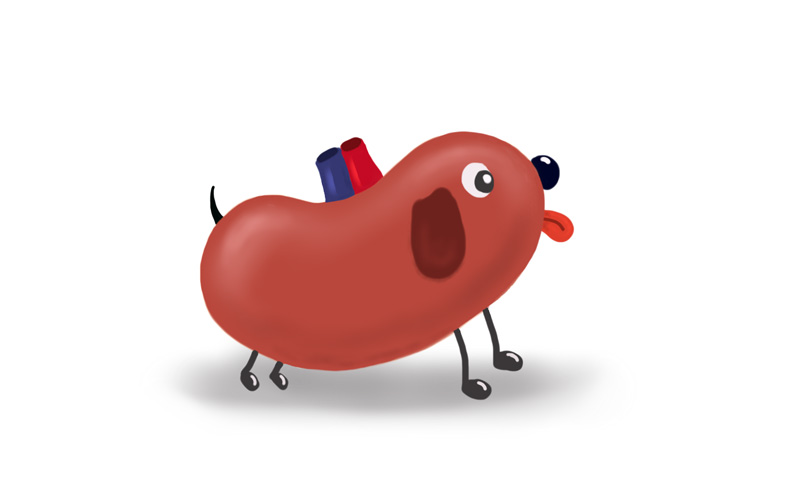It turns out that kidney stones don’t just afflict humans, they also occur in many animals, including your pet dog or cat. Between 0.2 to 3% of dogs and cats are believed to form stones and the number of pets developing stones appears to be increasing. Changes in the dietary content of commercial pet food, less active pet lifestyles, and the frequent development of urinary tract infections in cats have been proposed as possible reasons for the increase in stones seen in our four legged friends.
| Animal species reported to develop stones (source: Robinson 2008) | ||
| Dogs | Guinea pigs | Molluscs |
| Cats | Monkeys | Ferrets |
| Pigs | Hamsters | Minks |
| Cattle | Camels | Whales |
| Rabbits | Deer | Sea lions |
| Horses | Turtles | Dolphins |
| Sheep | Otters | Kangaroos |
| Goat | Chinchillas | Raccoons |
| Birds | Seals | Gerbils |
Type of dogs and cats most commonly affected by stones.
Researchers in Canada reviewing over 50,000 stones from dogs and cats between 1998 and 2008 reported that the most common stone types were calcium oxalate and struvite. In dogs, the most commonly affected breeds were the shih tzu, miniature schnauzer, bichon frse, lhasa apso, and yorkshire terrier. Dalmations were the most likely to have uric acid stones. Smaller dog breeds seem to be at increased risk for stones due to their having lower urine volumes as compared to larger breeds. The lower urine volume makes it easier for stone crystals to form, just like in humans. Cat breeds most commonly affected with stones were the domestic, himalayan, persian, and siamese.
Why do animals form stones?
The majority of kidney stones occurring in animals are due to the same factors also seen in humans, including issues with dietary intake, inborn metabolic disorders, poor drainage, and urinary tract infections. The determination of why a specific pet is forming stones is best determined by your veterinarian. Recently, an alarming but uncommon cause of stone formation in animals was caused by the illegal contamination of pet food. The illegal inclusion of melamine and cyanuric acid into animal feed (in order to boost its measured protein content) was found to lead to the development of melamine-cyanuric acid or melamine-uric acid kidney stones and kidney failure in pets that were given the food.
How would I know if my pet has a kidney stone?
Cats with a stone may present with vomiting, decreased appetite, weight loss, or lethargy. Cats may also have signs of a urinary tract infection including bad smelling urine or urine leakage. In dogs, urinary leakage, blood in the urine, vomiting, poor appetite, depression, or lethargy may be seen. Your veterinarian may notice signs on physical examination including an enlarged kidney or kidney pain on examination due to a blocking stone. Laboratory studies may indicate infection, kidney impairment, or low blood counts. Stone crystals seen in urine samples from a pet can be a clue that kidney stones are present. Confirmation of the diagnosis, as it is in humans, is through imaging with xrays, ultrasound, or CT scans.

I'm too cute to have a stone!
Treatment of dogs and cats with stones.
Stones in animals are usually treated initially using special diets. Occasionally your veterinarian may also suggest the addition of medications to inhibit or dissolve stones. Some stones in dogs and cats can be successfully expelled with the assistance of catheters and manual pressure on the animal’s bladder. Stones that cannot be resolved in this fashion may require surgical intervention. Traditionally, surgery for kidney stones in animals has been through open techniques to directly remove stones from the kidney, bladder, or ureter. More recently, advances in less invasive approaches, initially pioneered for the treatment of stones in humans, have been applied to the treatment of stones in animals with reports recently of successful shockwave lithotripsy, stents, nephrostomy tubes, and ureteroscopy.
References
Robinson and coauthors, “Urolithiasis: Not Just a 2-legged Animal Disease”. Journal of Urology 2008.
Houston and Moore, “Canine and feline urolithiasis: Examination of over 50,000 urolith submissions to the Canadian Veterinary Urolith Centre from 1998 to 2008”. Canadian Veterinary Journal 2009.
Berent, “Ureteral obstructions in dogs and cats: a review of traditional and new interventional diagnostic and therapeutic options”. Journal of Veterinary Emergency and Critical Care 2011.
Dorne and coauthors, “Recent advances in the risk assessment of melamine and cyanuric acid in animal feed”. Toxicology and Applied Pharmacology 2012.

Leave a Reply